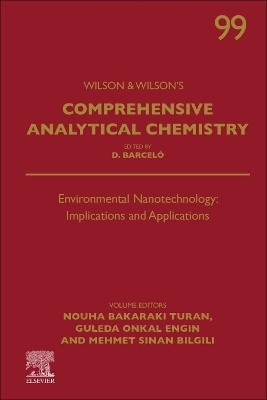
Environmental Nanotechnology: Implications and Applications
Elsevier - Health Sciences Division (Verlag)
978-0-323-98839-1 (ISBN)
Additional chapters in this comprehensive release include Nanomaterials as a tool for soil remediation in sustainable agriculture, Impact of nanoparticles in wastewater treatment, Nanoparticles in solid waste: Impact and management strategies, and Global regulations and legislations on nanoparticles usage and application in diverse horizons.
Nouha BAKARAKI TURAN is currently working at the Nitrosamine center of excellence at Novartis one of the biggest pharmaceuticals companies in the World. She did her post-doctoral research for 3 successive years in the Environmental Engineering Department and Analytical Chemistry Department of Yildiz Technical University, Turkey. She worked on a project that aims to detect microplastics abundance in the Marmara sea. She performed many studies on the determination of micropollutants in wastewater using different analytical methods. Besides, she worked on wastewater treatment using the advanced oxidation process and other biological processes such as the membrane bioreactor system. Additionally, she is a member of the "Bakirdere research group" which is one of the most active research groups in Turkey. Her Ph.D. was on quorum quenching mediated approaches to mitigate membrane fouling problems. She studied her B.S. in Health and Environment from the Lebanese University (Tripoli – Lebanon). During her B.S. she got experienced in chemical and microbiological quality analysis of water. In 2010, she received her MSc in Hydrology from the Lebanese University (Al Hadath – Lebanon). She did her MSc research study in the CNRS laboratory of Poitiers, France. Dr. Nouha believes highly in women's power in academic and scientific life. She aims to be an example status to all women around the world and especially in the middle east countries where women are usually highly restricted. She had an interesting journey to share with the youngest generation giving them hope, motivation and insistence. Güleda Engin completed her undergraduate education in 1992 at Dokuz Eylül University in the Department of Environmental Engineering. She received a scholarship from the Ministry of National Education to study abroad. After completing her MPhil thesis at the University of Hertfordshire, Department of Civil Engineering in 1997, she started her PhD studies at Imperial College, Department of Chemical and Process Engineering and received her doctorate degree in 2000. Güleda Engin, joined the Environmental Engineering Department, Gebze Institute of Technology in March 2001, and promoted as an associate professor in November 2005. In 2012, she has joined the Department of Environmental Engineering at Yildiz Technical University. She involved in many national and international projects including EU supported projects. Her research interests include wastewater treatment using membrane technologies, micropollutant removal, microplastic detection and characterization, and watershed information systems and climate change adaptation and mitigation. Guleda Engin has participated in over 60 national and international conferences and published more than 65 papers in indexed journals. She is currently the Head of the Department of Environmental Engineering at Yıldız Technical University. Mehmet Sinan Bilgili is a professor at Yildiz Technical University (YTU) and a member of the International Waste Working Group (IWWG). Since 2006, he has supervised over 30 Bachelor and 6 Master of Science Degree students as well as 5 doctorate students. He is currently supervising 11 Master’s degree research projects and 2 doctoral degree research project. Prof. Bilgili is the Editor of an International Journal, Environmental Research & Technology, and the organizer of EurAsia Waste Management Symposium which is being organized bi-annually. He has authored more than 50 scientific publications and more than 40 international symposium presentations. His research interests focus on Sustainable landfill gas management and treatment, waste characterization, municipal waste management, hazardous waste management, biological treatment of waste, hybrid methods for leachate treatment, water and wastewater treatment, hospital wastewater, micropollutant treatment and control, sewage sludge gasification, and environmental effects of nanomaterials.
Preface
Nouha Bakaraki Turan, Mehmet Sinan Bilgili and Güleda Onkal Engin
Nanoparticles: An overview
Nouha Bakaraki Turan
1. Nanomaterials and photocatalysis for environment: Applications and characterization
Tayssir Hamieh, Khaled Chawraba, Jacques Lalevée, Joumana Toufaily, Thibault Roques-Carmes, Céline Frochot and Frédéric Villiéras
2. Toxicity of inorganic nanoparticles
Madiha Khalid and Mohammad Abdollahi
3. Overview of nanoparticles technology usage for water treatment with an emphasis on the emerging water pollutants
Geetha Gopal, N Chandrasekaran and Amitava Mukherjee
4. Nanotechnology in wastewater treatment
Reham Mahmoud Abu Shmeis
5. Nanomaterials for groundwater remediation
Vicente de Oliveira Sousa Neto, Antonio Joel Ramiro de Castro, Gilberto Dantas Saraiva and Ronaldo Ferreira do Nascimento
6. Development of nano-sensor and biosensor as an air pollution detection technique for the foreseeable future
Elham Farouk Mohamed and Gamal Awad
7. Nanomaterials as a tool for soil remediation in sustainable agriculture
Sumit Chaturvedi, K. Govindaraju, P.S. Vijayakumar, K. Elango and M. Kannan
8. Impact of nanoparticles in wastewater treatment
Ashitha Gopinath, Swaminathan Jiji, Seema Singh, P. V. Nidheesh and M. Suresh Kumar
9. Nanoparticles in solid waste: Impact and management strategies
Nouha Bakaraki Turan, Guleda Onkal Engin and Mehmet Sinan Bilgili
10. Global regulations and legislations on nanoparticles usage and application in diverse horizons
Ajay Kumar Mishra, Rajeswari Das, Sanket Sahoo and Bisworanjita Biswal
| Erscheinungsdatum | 28.10.2022 |
|---|---|
| Reihe/Serie | Comprehensive Analytical Chemistry |
| Verlagsort | Philadelphia |
| Sprache | englisch |
| Maße | 152 x 229 mm |
| Gewicht | 1000 g |
| Themenwelt | Naturwissenschaften ► Chemie ► Analytische Chemie |
| ISBN-10 | 0-323-98839-3 / 0323988393 |
| ISBN-13 | 978-0-323-98839-1 / 9780323988391 |
| Zustand | Neuware |
| Informationen gemäß Produktsicherheitsverordnung (GPSR) | |
| Haben Sie eine Frage zum Produkt? |
aus dem Bereich


